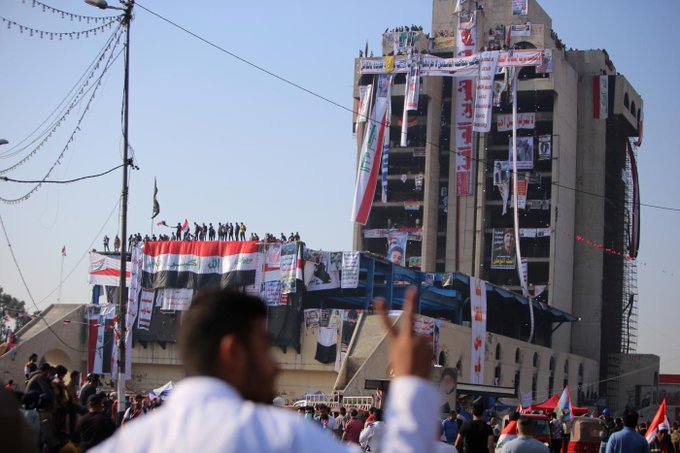Early elections do not address the roots of the problem, which is that the political system does not represent a growing part of the population. Iraq’s leaders struggle to maintain public authority. They do not share the country’s wealth with most of the population and are less able to gain popular support with ideological arguments than before.
More critically, since the last election in 2018, instead of systemic reform and improvement to address the decline in public trust evident in that year’s low turnout, the political system has become more violent.
Beyond the killings in protest squares, the system has developed mechanisms to thwart activists and civil society mobilizers before they mount demonstrations, with targeted assassinations, detention, torture, and intimidation of civil society and activists. The armed groups and militias kill in broad daylight, caught on CCTV cameras enjoying impunity for their work in protecting the political system.
Western diplomacy and aid during this time have sought to support efforts to rebuild trust between the elite and citizens. However, these Western initiatives have not engaged with the root of the problem, namely unaccountable governance.
Iraq’s entrenched political system has proven resilient to the challenge posed by protesters. In addition to the violence that defends the system, the elite have been unwilling to fundamentally reform. Despite the officials in this government who sympathize with the grievances of protesters, the ruling parties continue to compete and cooperate for the proceeds of state coffers, with little going back to society.
Corruption is politically sanctioned. It is part of the system. After this election, like the past ones, they will come together to divide not only ministerial positions but also senior civil servant positions in ministries. These positions will serve as channels to procure contracts and wealth from the Iraqi state.
As noted in Friday's snapshot, protesters came together in Baghdad. This is The October Revolution and it is still ongoing. So are the attempts by Iraq's security forces to harm them. There are reports of the protesters being beaten on Friday. Some are noting a 'lower' turnout on this anniversary than last year but they're failing to note that security forces were posted to prevent the gathering from becoming as large or larger.
Let's note some videos.
Ibn Ninewa Tweeted:
DAILY UMMAH INTERNATIONAL Tweets:
In the midst of a heavy security presence, the demonstrators, who began marching towards Tahrir Square, the center of the 2019 protests, raised Iraqi flags and pictures of young men killed during the bloody repression of the demonstrations at the time, killing about 600 people and wounding more than 30,000.
The banners also included pictures of activists who were later killed, such as Ihab al-Wazni, head of the protests coordination in Karbala, who was shot dead in May by armed men in front of his house with silencer pistols.
Others held banners reading “When will we see the killers behind bars” and “We want a homeland, we want change”, while the demonstrators are still calling on the government to hold those responsible for the assassinations of activists accountable.
Friday’s demonstrators also raised banners reading “Electing the same faces is a massacre for the homeland,” “No, no to corrupt parties, no to corrupt politicians,” and “Do not elect the one who killed me.”
Brandishing Iraqi flags and portraits of “martyrs”, they marched to Tahrir Square, an epicenter of the 2019 revolt, surrounded by a large number of riot police, AFP correspondents said.
“When will we see the killers behind bars?” and “No to corrupt parties, no to corrupt politicians,” said placards carried by the demonstrators who included women dressed in black.
On October 1, 2019, widespread rallies erupted across Baghdad and the south of the country against a government seen as corrupt, inept and beholden to Iran.
Protest-related violence killed nearly 600 people, including some shot dead while walking home from demonstrations.
THE WASHINGTON POST's Louisa Loveluck Tweets:
And:
Hundreds of Iraqis demanded justice for demonstrators killed during the
2019 October (Tishreen) protests at a rally in Baghdad on Friday, the
second anniversary of the protest movement and just over a week ahead of
parliamentary elections.
“This is my son. He went after his rights, his country … he was killed,”
Muhamad al-Zubaidi, carrying a photo of his son, told Rudaw’s Dildar
Harki.
The Tishreen protests condemned state corruption, failing public
services, and high unemployment. They lasted several months and were met
with violence and repression from state forces and militias backed by
Iran that left at least 600 dead and thousands wounded.
And the ASSOCIATED PRESS reports:
Hundreds of riot police and federal policemen fanned out in Baghdad ahead of the planned march.
“We don’t want a paradise, we want a nation,” read one of the banners carried by protesters who gathered Friday at Fardous Square and marched toward Tahrir Square, the epicenter of the October 2019 protests.
Another
banner read: “You will not silence the voice of Tishreen,” Arabic for
October, as Iraqis refer to the protests after the month they broke out.



